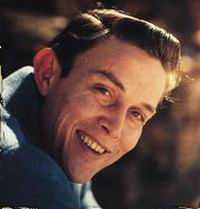b. Seth Ward, 10 August 1928, near Plainview, Texas, USA. Dean's mother, who was the family's only provider, ran a barber shop and as a boy, he picked cotton and worked on local farms. His mother taught him to play the piano when he was 10 years old and he taught himself guitar, accordion and harmonica as soon as he had access to the instruments. At 16, he began to study engineering but then joined the Merchant Marines for two years, after which he enlisted in the Air Force. It was during his service that Dean first became an entertainer when, with a band called the Tennessee Haymakers, he played local clubs and honkytonks near his base. He left the service in 1948 and for the next few years tried to develop his musical career. In 1952, with a new band called the Texas Wildcats, he toured US Army bases in the Caribbean, before finding work on WARL Arlington, Virginia, and WTOP-TV Washington. He first recorded for Four Star the same year and early in 1953, he gained his first US country Top 10 hit with "Bumming Around". He had a show called Town And Country Jamboree on WMAL-TV Washington in 1955 and due to its popularity and some syndication, CBS offered him his own networked programme. The Jimmy Dean Show ran from 1957 until 1958 but when it lost its sponsor and a proposed New York afternoon network series failed to materialize, Dean decided to abandon television. He continued to tour, signed to Columbia and in 1961, wrote and recorded a number called "Big Bad John". The song became a million-seller and a number 1 record in both the US country and pop charts. It also became a UK hit, reaching number 2 in the UK pop charts the same year. The song also was voted the Best Country and Western Recording Of 1961. Surprisingly, it was the first song that Dean had ever written. Over the years there have been several parodies of "Big Bad John" including those by Marvin Rainwater ("Tough Top Cat"), Des O'Connor ("Thin Chow Mein") and the Country Gentlemen ("Big Bruce"). In 1962, five further US chart hits followed, including a sequel to "Big Bad John", all achieving crossover success. Although this time not written by the artist, "The Cajun Queen" used the same melody, but Dean later admitted that he hated recording it. Released as the b-side of the sugary narration "To A Sleeping Beauty", it gave the single double-sided chart success. His hits also included "P.T.109", a song devoted to the wartime career of John F. Kennedy. Several other b-sides also proved popular with the record-buying public including the amusing "I Won't Go Huntin' With You, Jake" and "Please Pass The Biscuits". From 1963-66, he hosted a new show on the ABC-TV network and was much in demand for appearances on other major shows. He had another number 1 country hit with "The First Thing Every Morning (And The Last Thing Every Night)" in 1965 and the following year, after moving to RCA, charted with "Stand Beside Me". Some further hits followed, including "A Thing Called Love", but during the 70s, his career slowed down as he concentrated on his pork sausage manufacturing business. Notable among his later hits were a duet with Dottie West on Webb Pierce's "Slowly" and a crossover country and pop hit narrative called "I.O.U", which he claimed was his ode of thanks to his mother. This was equally as sugary as his new version of "To A Sleeping Beauty", both of which he made for Casino. A further recording of "I.O.U", this time for Churchill in 1983, marked his 26th and last country chart entry. In the 80s, he still maintained some television and show appearances though it has been suggested that he preferred a string of sausages to a string of hits. Throughout his career, his easy-going, crooning style and presentation managed to bridge the gap between pop and country music more successfully than many other artists ever managed, and his television shows certainly provided a shop window for many artists as well as generating interest in country music.
Source: [http://www.cmt.com ; http://www.theiceberg.com](http://www.cmt.com ; http://www.theiceberg.com)
